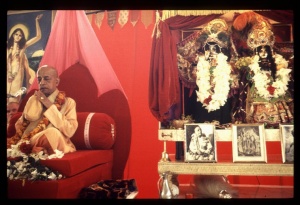CC Madhya 9.282 (1975): Difference between revisions
(Vanibot #0027: CCMirror - Mirror CC's 1996 edition to form a basis for 1975) |
(Vanibot #0020: VersionCompareLinker - added a link to the Version Compare feature) |
||
| Line 2: | Line 2: | ||
<div style="float:left">'''[[Sri Caitanya-caritamrta (1975)|Śrī Caitanya-caritāmṛta (1975)]] - [[CC Madhya (1975)|Madhya-līlā]] - [[CC Madhya 9 (1975)|Chapter 9: Lord Śrī Caitanya Mahāprabhu's Travels to the Holy Places]]'''</div> | <div style="float:left">'''[[Sri Caitanya-caritamrta (1975)|Śrī Caitanya-caritāmṛta (1975)]] - [[CC Madhya (1975)|Madhya-līlā]] - [[CC Madhya 9 (1975)|Chapter 9: Lord Śrī Caitanya Mahāprabhu's Travels to the Holy Places]]'''</div> | ||
<div style="float:right">[[File:Go-previous.png|link=CC Madhya 9.281 (1975)|Madhya-līlā 9.281]] '''[[CC Madhya 9.281 (1975)|Madhya-līlā 9.281]] - [[CC Madhya 9.283 (1975)|Madhya-līlā 9.283]]''' [[File:Go-next.png|link=CC Madhya 9.283 (1975)|Madhya-līlā 9.283]]</div> | <div style="float:right">[[File:Go-previous.png|link=CC Madhya 9.281 (1975)|Madhya-līlā 9.281]] '''[[CC Madhya 9.281 (1975)|Madhya-līlā 9.281]] - [[CC Madhya 9.283 (1975)|Madhya-līlā 9.283]]''' [[File:Go-next.png|link=CC Madhya 9.283 (1975)|Madhya-līlā 9.283]]</div> | ||
{{CompareVersions|CC|Madhya 9.282|CC 1975|CC 1996}} | |||
{{RandomImage}} | {{RandomImage}} | ||
==== TEXT 282 ==== | ==== TEXT 282 ==== | ||
| Line 11: | Line 10: | ||
<div class="verse"> | <div class="verse"> | ||
:tathā haite pāṇḍarapure āilā gauracandra | :tathā haite pāṇḍarapure āilā gauracandra | ||
:viṭhṭhala-ṭhākura | :viṭhṭhala-ṭhākura dekhi' pāilā ānanda | ||
</div> | </div> | ||
| Line 18: | Line 17: | ||
<div class="synonyms"> | <div class="synonyms"> | ||
tathā haite—from there; pāṇḍara-pure—to Pāṇḍarapura; āilā—came; gauracandra—Lord Śrī Caitanya Mahāprabhu; viṭhṭhala-ṭhākura—the Deity known as Viṭhṭhala; | tathā haite—from there; pāṇḍara-pure—to Pāṇḍarapura; āilā—came; gauracandra—Lord Śrī Caitanya Mahāprabhu; viṭhṭhala-ṭhākura—the Deity known as Viṭhṭhala; dekhi'-seeing; pāilā—got; ānanda—great happiness. | ||
</div> | </div> | ||
| Line 32: | Line 31: | ||
<div class="purport"> | <div class="purport"> | ||
This city of Pāṇḍarapura is situated on the river Bhīmā. It is said that Śrī Caitanya Mahāprabhu initiated Tukārāma when He visited Pāṇḍarapura. This Tukārāma Ācārya became very famous in the Maharashtra province, and he spread the saṅkīrtana movement all over the province. The saṅkīrtana party belonging to Tukārāma is still very popular in Bombay and throughout the province of Maharashtra. Tukārāma was a disciple of Śrī Caitanya Mahāprabhu, and his book is known as Abhaṅga. His saṅkīrtana party exactly resembles the Gauḍīya-Vaiṣṇava saṅkīrtana parties, for they chant the holy name of the Lord with mṛdaṅga and karatālas. | |||
The Lord Viṭhṭhaladeva mentioned in this verse is a form of Lord Viṣṇu with | The Lord Viṭhṭhaladeva mentioned in this verse is a form of Lord Viṣṇu with four hands. He is Nārāyaṇa. | ||
</div> | </div> | ||
Latest revision as of 21:03, 27 January 2020

A.C. Bhaktivedanta Swami Prabhupada
TEXT 282
- tathā haite pāṇḍarapure āilā gauracandra
- viṭhṭhala-ṭhākura dekhi' pāilā ānanda
SYNONYMS
tathā haite—from there; pāṇḍara-pure—to Pāṇḍarapura; āilā—came; gauracandra—Lord Śrī Caitanya Mahāprabhu; viṭhṭhala-ṭhākura—the Deity known as Viṭhṭhala; dekhi'-seeing; pāilā—got; ānanda—great happiness.
TRANSLATION
From there Śrī Caitanya Mahāprabhu went to Pāṇḍarapura, where He happily saw the temple of Viṭhṭhala Ṭhākura.
PURPORT
This city of Pāṇḍarapura is situated on the river Bhīmā. It is said that Śrī Caitanya Mahāprabhu initiated Tukārāma when He visited Pāṇḍarapura. This Tukārāma Ācārya became very famous in the Maharashtra province, and he spread the saṅkīrtana movement all over the province. The saṅkīrtana party belonging to Tukārāma is still very popular in Bombay and throughout the province of Maharashtra. Tukārāma was a disciple of Śrī Caitanya Mahāprabhu, and his book is known as Abhaṅga. His saṅkīrtana party exactly resembles the Gauḍīya-Vaiṣṇava saṅkīrtana parties, for they chant the holy name of the Lord with mṛdaṅga and karatālas.
The Lord Viṭhṭhaladeva mentioned in this verse is a form of Lord Viṣṇu with four hands. He is Nārāyaṇa.